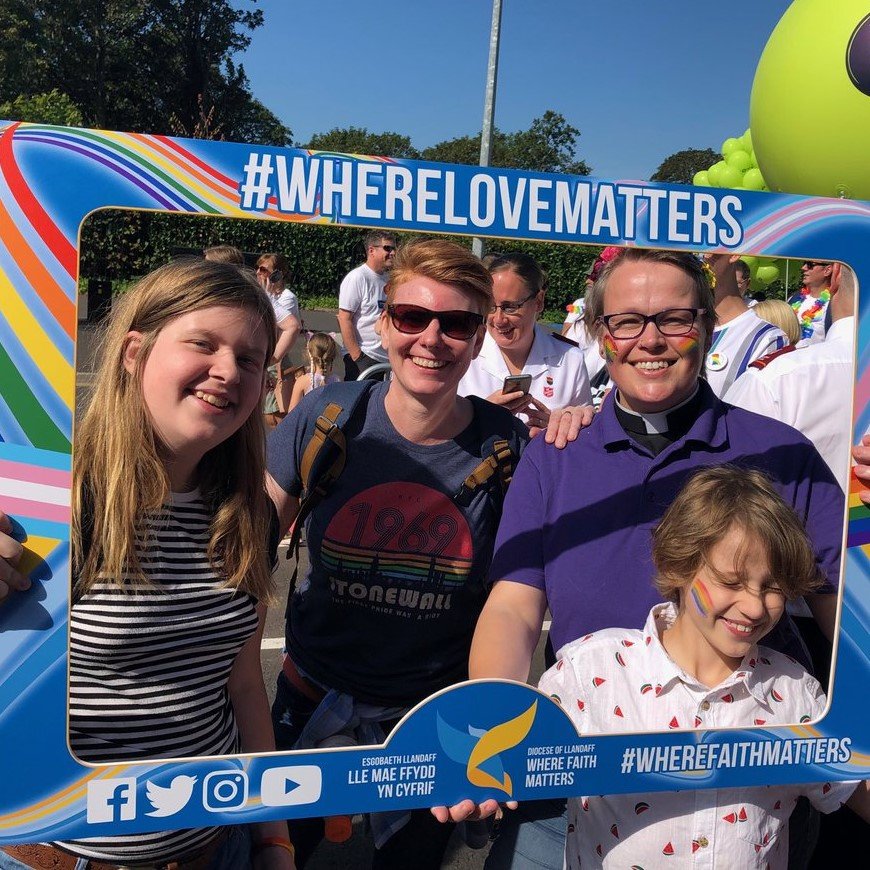What is queer theology?
Rose and her family at Pride Cymru
“Queer theology is a voice from the margins that is not seeking to be mainstream.”
As we celebrate LGBT+ History Month, Revd Rose Hill, a priest in the Church In Wales Diocese of Llandaff, introduces us to Queer Theology and recommends three books to explore this subject further.
I have to admit to some trepidation, when I was approached to submit a blog on queer theology for LGBT+ History Month. I am in no way an expert but I have been increasingly engaging with queer theology in both my academic research and my own personal, theological nourishment.
So what is queer theology?
Essentially, it is how we engage with concepts of God and how we talk about God and the Bible from a point of view that isn’t mainstream, male and heterosexual. ‘Queer’ has been and is still used as a term of insult to many in the LGBTQIA+ community and so essentially it is a taking back and reframing of the narratives, doctrines and teachings about God and the Bible that seek to denigrate and ‘other’ LGBTQIA+ voices in theology.
As Linn Tonstad, Associate Professor of Theology, Religion, and Sexuality at Yale Divinity School, suggests, it is a denaturalisation - it seeks to unpick those previously accepted certainties, those things that we are told are the natural order or concrete facts and demonstrate that they are human constructs of perceptions of God and divinity that are open to interpretations. Queer theology is a voice from the margins that is not seeking to be mainstream. It’s very strength is that it speaks into the mainstream and highlights the limitations of theological thinking that otherwise remain unchallenged.
I am only at the beginning of my journey of exploration of queer theology. However, I offer three books that I have found not only incredibly helpful in my research, but also in my personal journey to overcome years of internalised homophobia and misogyny that have been laid on my heart as an LGBTQIA+ Christian.
Two of the books are very much introductions, not only to queer theology but also queer theory as a whole, as it is not only the field of theology that is finding itself queered. The third book is more of a vocational text, something I wish I had been able to read as a teenager.
Radical Love: An Introduction to Queer Theology by Patrick S. Cheng
Radical Love is an excellent introduction to queer theology. It is simple and straightforward, and seeks to provide a whistle stop tour of queer theology. It lends itself easily to group study, and would make for a challenging Lent study group. It explores and explains terminology and engages with topics such as the person of God, the Trinity, gender and sexuality. The questions at the end of each chapter are simply phrased and will provide good group discussion, and the provision of further reading is also handy. By its very nature the book is limited in how far it can explore queer theology in any depth but it is a useful starter.
Queer Theology: Beyond Apologetics by Linn Marie Tonstad
If Radical Love whets your appetite to further explore queer theology, then Queer Theology is a very good follow-up text. Tonstad goes into more detail than Cheng, and provides a more in-depth definition of queer theology. Her writing is interesting and appealing, and she handles difficult topics with seeming ease.
She provides summaries of the major writers such as Marcella Althaus-Reid, but also highlights and explores the limitations of queer theology. Her writing is witty and engaging and, although clearly more of an academic text, it is certainly not a chore to read.
One Coin Found: How God’s love stretches to the margins by Emmy Kepler
This is a book that I wish I had read as teenager, when I was struggling not only to come to terms with my sexuality, but also my vocation to the priesthood, and again in theological college when I was experiencing the fall out of finally, publicly having to ‘come out’. It is a beautiful work of love that explores the author’s journey through her spiritual life and how she reconciled her faith and her identity as a queer woman. It is enchanting in its descriptions of the sacraments and is realistic but yet still uplifting in the descriptions of the author’s relationship with God and Prayer. It is an incredibly nourishing book and would make an excellent personal Lenten read.





